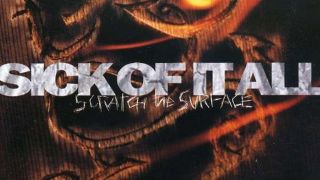It seems strange to even think it now, but 20 years ago you couldn’t buy hardcore bands' t-shirts in Hot Topic, you wouldn’t see them playing main stages of huge festivals, the mainstream crossover had yet to cross over. It’s strange because now the look and sound of hardcore is so commonplace in the fabric of rock that it feels like it’s been there forever. But it hasn’t.
Twenty years ago hardcore took its first momentous steps toward wider acceptance when Sick Of It All’s third album Scratch The Surface was released on major label Eastwest Records. Twelve tracks of hyper kinetic, violent and brutal steamroller punk that was as groovy and heavy as anything in metal at the time. It spawned anthems in the likes of the title track and the immortal Step Down, and it also introduces the wider world to one of the most intense live acts in the history of music. Full. Fucking. Stop. In the process it became the first hardcore LP to come out on a major. “Yeah that’s right,” says SOIA frontman Lou Koller. “I don’t think that we get enough credit for that. It was, as you say, the first.”
Its impact on the scene is still being felt to this very day and, as Lou explains, it has helped the scene all the way down to a grassroots level. “We showed that, yeah we might not sell a million records, but that hardcore isn’t a little fad that you have to do through mail order.”
“I think a lot of metal labels took notice. It opened a lot of doors and a lot of indie labels benefitted from it, majors saw how well we did and thought that they could invest in a smaller label and see a financial return. Labels like Trustkill and Victory made a great deal of money from us being on a major, whether they want to admit it or not.”
It’s clearly true. After Scratch The Surface began to muscle its way into the metal scene suddenly heavyweight label Roadrunner Records were snapping up Madball, Hatebreed, Shelter, Biohazard and other hardcore related acts. This, of course, lead to opposition from the underground.
What was the scene’s reaction to you signing to the label?
“Well, we never thought much of it but all around us friends of ours were coming up to us and saying that because we were on a major the label were going to make us sound like Green Day or something.” Lou laughs. “But we just kept on writing. We rented out this studio and there was only us and one other band in there; The Rollins Band. So we could concentrate on making music that was darker and heavier than anything we’d done before.”
This being new territory to conquer, how was the band’s experience in their new home? Did they dream of becoming as big as Pearl Jam or Metallica?
“We try to stay rooted in ourselves. We didn’t think we were going to be millionaires, it was just another outlet for our music,” shrugs Lou before admitting that there were a number of frustrations as the relationship progressed. “The European office were really great to us but the US branch really dropped the ball on Scratch The Surface, then it went the other way on (1997’s follow up) Built To Last. The European one went really badly and the American one did a good job. What we didn’t like about a major was that people just change over so fast. You didn’t have a set group of people that you could work with and rely on. That punk ethic was not there.”
Twenty years on and Sick Of It All are still doing what they do, not on a major and not on anyone else’s terms but their own. Just as they always have. As for the genre that Scratch The Surface helped to popularise? Well, that’s a different story. In some cases the thing that now passes for hardcore bares no resemblances to the ugly blasts of rage like Malajusted or No Cure that pulverise you on Scratch The Surface.
So Lou, what do you say to the kid in front of you in a Blessthefall shirt who is a year younger than your breakthrough record and claims to be into hardcore?
“Every kid is going to have their own idea of hardcore, their own Cro-Mags.” He very reasonably claims. “I remember when Hatebreed came out and I went to see them and kids were just killing each other, and I was like ‘Yeah, it’s heavy but it’s no Cro-Mags’. But to those kids Hatebreed was the Cro-Mags. Hopefully if you like a band and you like a sound then you’ll investigate the roots of that music. It’s usually when you get a bit older. When I was young I listened to Venom and Motörhead and stuff like that, and also UK punk bands like GBH and Discharge. Then I went deeper to find Reagan Youth and stuff like that. Hopefully if you love music, you check out the roots of those bands.”
If you’ve yet to do so, go seek those roots out now.

![Sick of It All - Scratch the Surface [ FULL ALBUM ] - YouTube](https://img.youtube.com/vi/Ee1vONEufS0/maxresdefault.jpg)

